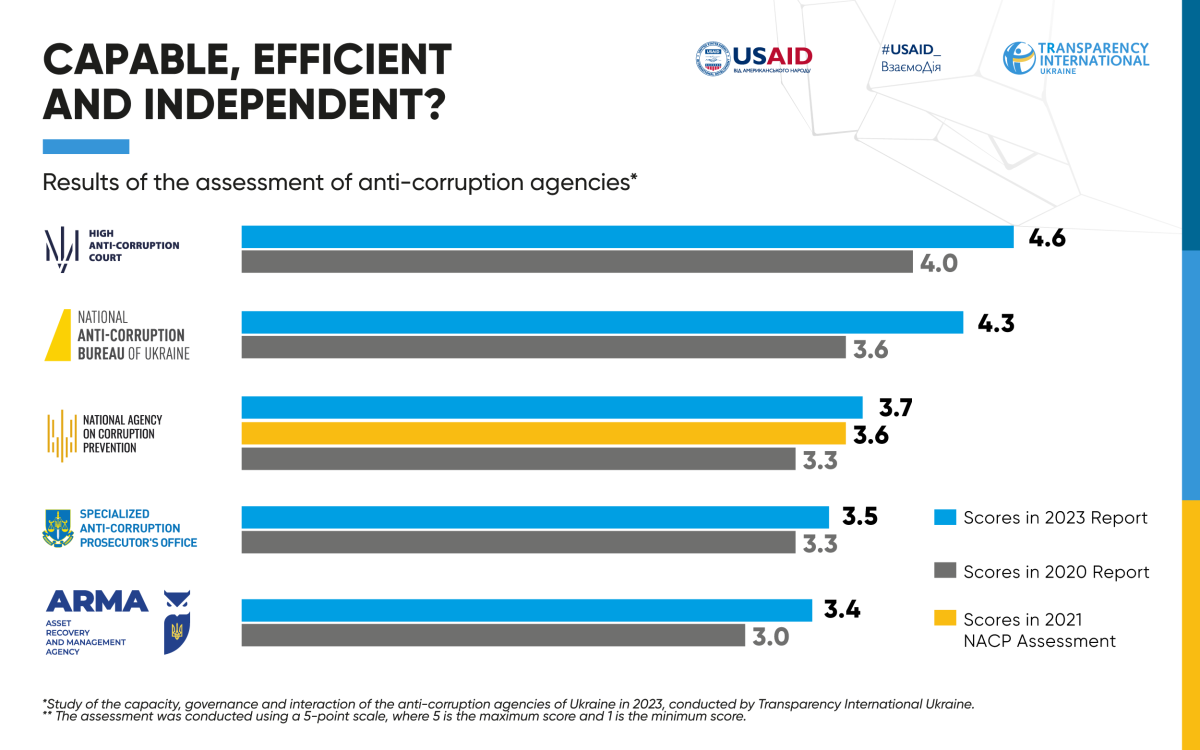

Anti-corruption authorities improved their average overall score in comparison with the previous survey in 2020 by 0.5 points, from 3.4 to 3.9. The HACC obtained the best score at 4.6 points, while the ARMA had the worst result with 3.4 points.
This was published by Transparency International Ukraine in the Study of Capacity, Governance, and Interaction of Agencies That Make Up Ukraine’s Anti-Corruption Infrastructure 2023, conducted with the support of the USAID project “Supporting Anti-Corruption Champion Institutions” (SACCI).
Overall, the results indicate that the anti-corruption infrastructure is progressing, but there is a lot to be done.
Deputy Executive Director for Legal Affairs of TI Ukraine Kateryna Ryzhenko
Anti-corruption agencies were scored on a scale from 1 to 5, with 5 being the maximum. In the study, the anti-corruption bodies received the following scores:
1) The HACC — 4.6 points (4.0 in 2020)
2) The SAPO — 3.5 points (3.3 in 2020)
3) The NABU — 4.3 points (3.6 in 2020)
4) The NACP — 3.7 points (3.3 in 2020; 3.6 in an assessment conducted in 2021)
5) The ARMA — 3.4 points (3.0 in 2020)
Of the 103 recommendations provided in the 2020 study, 23 were fully fulfilled, 36 partially fulfilled, and 41 not fulfilled at all.
“Despite the overall progress in the work of anti-corruption agencies, some were able to achieve better results in the implementation of recommendations, while others progressed more slowly. The smallest progress was made by the SAPO (+0.2 points), and the highest by the NABU and the HACC (+0.7 and +0.6 points). Overall, the results indicate that the anti-corruption infrastructure is progressing, but there is a lot to be done. This year, we also provided recommendations to every agency, and we intend on following their implementation,” said Deputy Executive Director for Legal Affairs of TI Ukraine Kateryna Ryzhenko.
In this year’s study, TI Ukraine has provided 25 high-priority recommendations, which, if fulfilled, will have a major impact on the work of anti-corruption agencies.
Despite the overall progress in the work of anti-corruption agencies, some were able to achieve better results in the implementation of recommendations, while others progressed more slowly.
Deputy Executive Director for Legal Affairs of TI Ukraine Kateryna Ryzhenko
The research methodology has been developed taking into account the main approaches of the National Integrity System (NIS), developed and implemented by the international anti-corruption network Transparency International.
The draft study was provided to anti-corruption infrastructure agencies for preliminary perusal, comments, and corrections.
This research was made possible by the support of the American people through the United States Agency for International Development (USAID) within the SACCI project. The contents of this publication are the sole responsibility of Transparency International Ukraine and do not necessarily reflect the views of USAID or the United States Government.
For reference: The Support to Anti-Corruption Champion Institutions (SACCI) Program in Ukraine is a six-year USAID initiative that has an objective to assist Ukraine to reduce corruption and increase the accountability and transparency of governance in Ukraine. The program seeks to empower key government institutions to fight corruption, build public support for and engagement in anti-corruption efforts, and reduce citizen tolerance to corruption, as well as ensure maximum transparency and accountability of Ukraine’s post-war recovery and reconstruction.
Anti-corruption authorities improved their average overall score in comparison with the previous survey in 2020 by 0.5 points, from 3.4 to 3.9.








